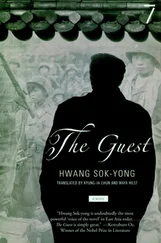I thought I heard her say: “This isn’t the place.” No sooner did I hear those words than she turned and ran off. Actually, I’m not sure whether she ran away or faded away right before my eyes. I hurried out the gate, wondering where she’d vanished to, and saw that she was already way down at the far end of the path that ran along the other houses, which were all similar in size and shape to ours. Her ponytail swayed back and forth as she went. She stopped in front of a house with an apricot tree in the yard, turned to look my way, and slipped inside. The reason I remember that ponytail is because of the bright red ribbon fluttering at the end of it. That night, while we were all eating dinner, our mother told Father there’d been a death in the neighbourhood.
“We need to give some condolence money to the head of the neighbourhood unit. Her family just lost their grandson.”
“What? How did he die?”
Before Mother could answer Father’s question, Grandmother muttered to herself: “Must have been something in his past life. It’s fate.”
“You don’t think it’s the typhoid fever that’s been going around?”
I tugged on the hem of Grandmother’s skirt to tell her what I’d seen earlier.
“Grandma! Grandma!”
“Yes, yes, let’s eat.”
“I saw something earlier, Grandma. A little girl came to our door and then left. She went into the house with the apricot tree in the yard.”
No one paid any attention, but after dinner Grandmother pulled me aside, sat me down on the twenmaru and asked me a lot of questions.
“Who did you say you saw?”
“A little girl dressed all in white. Hindungi barked at her and tried to bite her. When she saw me, she said, ‘This isn’t the place,’ and left. I wondered where she was going so I followed her outside, and I saw her go into the apricot-tree house.”
“Did you make eye contact with her?”
“Yes! Right before she went in, she turned and looked at me.”
Grandmother nodded and stroked my hair.
“You’ll be all right,” she said. “You’ve got the gift in your blood. Now, do as Grandmother tells you. Spit on the ground three times and stamp your left foot three times.”
That day I became very ill. My body got really hot, and I started talking nonsense. It went on all night. Father carried me on his back to a hospital down near the harbour. Children and old people who’d been brought there from towns and villages nearby were lying in rows in every room. I don’t remember how many days I spent there. All I do remember is seeing that little girl perched on the ledge of the lattice window, close to where several people were lying. I stared up at her. I wasn’t afraid. After I was sent home, my sisters were moved out of the back room where we normally all slept, and my grandmother stayed by my side. She was the only one who would come near me. My fever would dip during the day and then set me afire again at night. Hives the size of millet seeds broke out all over my body and took a long time to go away. Grandmother kept asking me about the girl.
“Do you still see her?”
“No, but I did at the hospital. Grandma, who is she?”
“That’s the typhoid ghost. Nothing will happen to you. My guardian spirit is keeping watch.”
I don’t know how long I was sick. I kept slipping in and out of sleep both day and night. I can still remember the dream I had:
I enter the grounds of what looks like an old temple. A stone wall has collapsed, and tiles from the half-caved-in roof lie scattered about in the reedy, weed-filled courtyard. I don’t go into the darkened temple, but instead stand nervously next to a slanting pillar and peer inside. Something moves. A dark red ribbon comes slithering out of the shadows. I turn and start to run. The ribbon stands on end and springs after me. I run through a forest, wade across a stream and cut through rice paddies, clambering over the high ridges between them, and make it back to the entrance of our village. The whole time, that red ribbon is dancing after me. Just then, Grandmother appears. She looks different — she’s wearing a white hanbok and has her hair up in a chignon with a long hairpin holding it in place. She pushes me behind her and lets out a loud yell:
“Hex, be gone!”
The ribbon slithers to the ground and vanishes.
I woke up in a panic. My body and face were drenched in sweat as if I’d been caught in a rainstorm. Grandmother sat up and wiped my face and neck with a cotton cloth. “Hold on just a little longer, and it’ll pass,” she said.
Though I was awake, my body kept growing and shrinking over and over as the fever rose and fell. My arms and legs grew longer and longer until they were pressed up against the floor and the walls. Then they shrivelled and shrank up smaller than beans, like rolled up balls of snot dug from both nostrils, and got softer and softer until the skin burst. The warm floor against my back dropped and carried me down, down, down, into the earth below. Faces appeared in the wallpaper. Their mouths opened, and they laughed and chattered noisily at me.
I made it through the typhoid fever, but for several years, right up until I started school, I remained frail. I started hearing things I hadn’t heard before and seeing things that weren’t there before. That was also when I started communicating with our mute sister, Sook. Jung, the fourth-oldest, and Sook, the fifth, were only a year apart and were always at each other’s throats. It was the same with Hyun and me — as she was the second-youngest after me, I never bothered treating her like an older sister and she was always irritated with me because of it. Jin, Sun and Mi were much older than the rest of us, and they were bigger too. After all, a good three years separated Mi and the next one down, Jung. Anyway, Hyun and I were both treated like babies by everyone else, but Jung and Sook were awkwardly positioned in the family. Whenever an errand had to be run, it always fell to them. Between the two of them, Jung was the easier mark. Since Sook couldn’t talk, there was a limit to what she could be ordered to do. For instance, if you told them to run down to the greengrocer at the bottom of the hill and bring back some tofu and green onions, Jung would push her bottom lip out and glare menacingly at Sook.
“I get stuck having to do everything because of her .”
Because she couldn’t communicate through words, Sook was short-tempered. She would get along with everyone fine for a while, doing what she was told, but the moment she lost her temper she was ripping out clumps of hair and kicking in stomachs — big sister, little sister, none of that mattered when she was on the attack. For that reason, our parents did their best to treat Jung and Sook equally. When they bought us clothes, Jung and Sook were given identical styles and patterns, and even pencils were doled out in identical sets of three.
One morning, my sisters were running around getting ready for school, taking turns going to the toilet, washing their faces and combing their hair when Sook began to shriek. Her face turned bright red from screaming, but since she couldn’t speak, no one knew what was wrong. She was holding something in her hand and shaking it: a single scorched trainer. It seemed that the trainer, which had been washed the night before and set on top of the warm, wood-burning stove to dry, had fallen in front of the open flames. Naturally, Sook and Jung wore identical blue trainers. Clever Jung had snatched up the unscathed pair and put them on, claiming they were hers, and left the burned shoe where she’d found it. Sook threw the burned shoe and hurled herself at Jung, grabbing her around the waist and tackling her. Jung squirmed and struggled as Sook pulled the undamaged shoes off Jung’s feet. That was her way of saying they were hers. Unwilling to admit defeat, Jung bit her arm. Their screaming and crying shook the whole neighbourhood. Father, who was steaming with anger, changed his mind about leaving for work and made them line up at the edge of the twenmaru so he could take a switch to their calves.
Читать дальше












